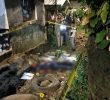 Related Stories
Related Stories
The Rise and Rise of Rodrigo Duterte
Teenagers Perish in Davao�s Killing Fields
DAVAO CITY (davaotoday.com) � Mayor Rodrigo Duterte likes to regale his guests with the story of how, one time, using a piece of firewood, he crushed the hands of a man accused of stealing hand-held radios. The problem with the story, as the mayor himself would tell his visitors, is that he had actually punished the wrong man.
Duterte laughed out loud when he narrated this story one evening last week, during dinner with friends and journalists. He used the story to drive home the point that he hates thieves and criminals with passion.
The irony was apparently lost on him. To his critics, however, this story illustrates perfectly what is so wrong with Duterte�s obsession with ridding the city of criminals using what has been described by the mayor�s critics as criminal methods. Because he sidesteps due process, they say, he is bound to make mistakes sooner or later.
Indeed, according to the Coalition Against Summary Executions (CASE), an alliance of human rights and child advocates in the city, 12 of the 469 murdered by death squads or hired killers here from 1998 until 2005 had been cases of mistaken identity.
This year has seen the worst so far in the killings that have made this city infamous, with 147 summary executions. CASE said the murders have become even more brazen. �They shoot pointblank in broad daylight, even in busy spots like the entrance of a downtown shopping mall,� said Ricmar Mapalo, the group�s spokesman.
But many of his supporters, mainly law enforcers, businessmen and members of the city�s political and economic elite, laud the man and his crime-fighting method. They say of all the mayors this city has had, nobody quite changed it the way Duterte did. Duterte is one leader �who can implement the law,� said Leo Avila, chair of the Committee on Ethics and Good Governance at the City Council.
�My hatred for criminals � that�s what changed Davao City,� Duterte told the editors of davaotoday.com last week. In that interview, Duterte made no bones about his views of criminals, and offered a fascinating � if at times disturbing � insight into the mind of one of the most controversial and popular political leaders in the Philippines.
Excerpts:
Some say there have been cases of mistaken identity in these killings?
If they have the facts, why don�t they file a case in court or come to me and show to me? Why can�t they do that?
I remember the case of (human-rights worker Rashid) Manahan. He had received death threats in Cotabato. When he was killed in my city, they say I ordered the killing. Putang ina! Why would I kill a poor guy who was just working for an NGO? If you want, I�ll line up all the human-rights commissioners and kill them all.
They say you don�t touch the big fish.
Puta… I don�t hit the big fish? Hesusmaryosep! I know I cannot get (industrialist Jesus) Ayala and (banana magnate Antonio) Floirendo because they don�t use drugs!
How safe is Davao City?
Very safe, I would say, except for the terrorists. But the common crimes like snatching� That�s petty. I cannot kill a human being just because he stole small items. That�s too expensive a payment. I deal with kidnappers, especially people who kill, or people who rape and kill.
They make your blood boil.
I�m like that. It�s my human nature. And you know human nature is part of your character. That�s my persona.
What has changed about you since you first ran for mayor,
since you were a prosecutor?
I hate to mention this because I�m not trying to make a big issue out of it. I grew up with politics because my father was governor. So practically I have a good training about how to deal with problems of people.
My hatred of criminals � that�s what changed Davao. If I have not improved the lot of the poor folk there at Boulevard, it�s simply because of the economy. But what actually, to me, made the difference is at least the criminals here are afraid of the law. Here, if you are a police officer and you steal from a civilian, putang ina, I�m going to kill you. God, I will! I�ll M16 you in public.
You know, governance or whatever in public office — it’s all about sense and sensibility. That is all that is needed. I am proud that I walk the extra mile to see to it that this city is peaceful.
We�d like to make this clear: Each time you say you�d kill somebody�.
That is all talk! (Laughs.)
But isn�t that a form of taking the law into your own hands?
No, it’s a form of a threat, instilling fear in the minds of criminals. So, if you are a journalist, if you are an ordinary citizen, why should you be afraid? Unless you believe your mayor is a candidate for a mental asylum. (Laughs.) Why would you be afraid each time I say, �You criminals are sons of bitches! I�m going to kill all of you!�? If you�re afraid, then you must be a criminal.
Doesn’t that put you in danger of being implicated if
something happens to these people after you say those things?
You know, guilt is personal. Remember that it’s a principle of criminal law. Guilt is personal. There is no guilt by association just because I’m the mayor talking here nonsense.
Each time I threaten them, there�s always a qualification: �You terrorists, putang ina, I�m going to kill you!� As you see, they end up dead. (Laughs.)
What happens if you�re no longer mayor? The fear by the criminals could be of you, not the law. What happens if you�re no longer there and the person who replaces you is not as strong as —
Putang ina, even if I�m asleep, wake me up and I�ll deal with it. (Laughs.) I�m never afraid of criminals, even when I was not yet a mayor. When I was a prosecutor, I kicked a man in the chest inside the court room.
Were you cited in contempt?
Of course! (Laughs.) I was a prosecutor and I was in jail. (Laughs.)
Why can�t you just prosecute these criminals, bring them to justice?
Some of them are dead. The others, we�re still going to kill them.
Were you frustrated with the legal system?
I began as a prosecutor, right? So take it from me. When I was a prosecutor for 10 years, this thing called guilt � that�s always an 80-20 proposition and all you have to do is to create doubt. And because of stringent regulations about right to counsel, information, due process and everything � these are so limited. What can you get from a terrorist during 36 hours of detention? Let�s be frank. What can you get?
The judicial process is too complicated?
It�s not just that. It�s the law itself. Because government is supposed to be powerful it owns everything but there’s a barrier and that barrier is the Bill of Rights. It protects the citizens from abusive excesses, inordinate exercise of power. The problem is, they abuse it, so the criminals are in and out of prison. That�s what I hate about it.
Let�s put it this way. I am not about ready to admit any particular killing here. (Laughs.) I can go to prison. What I�m trying to say is that I�m trying hard to make everybody realize, both the civilians and criminals, that if you commit a serious crime, you’ll just have to pay for it. Maybe inside the prison or maybe lose your funds or lose your life.
How do you know that your threats against criminals are working?
Look around. Compare it to other places. How could you not see it? Go around the city�
Have you given up on due process?
No, I should not waive anything there in the Bill of Rights. I think that we should observe it strictly. But if you do not leave room for me to exercise my discretion of human rights or if you do not give me that space, if you box me in one corner, you do not leave me an elbow room to give you, to afford you that right, in the end, you will lose everything… maybe including your life.
But what about the children? Many of those killed were minors.
(Stammers.) That�s a collateral� social problem. It becomes a collater� collateral itself. Its not a question of crime anymore. That�s what makes things difficult. Well, that is another problem. I cannot answer that. (davaotoday.com)










